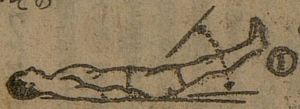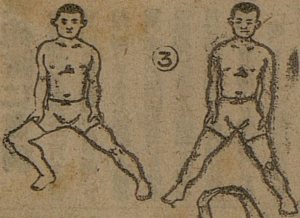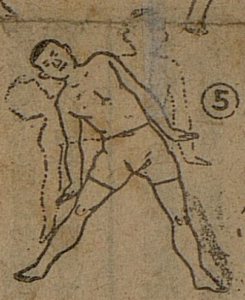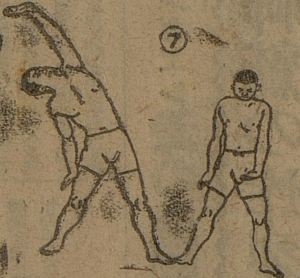It was January 1945, in the final desperate months of World War II. As fuel and fabric shortages deepened, the Japanese colonial regime in Korea began promoting the teachings of Dr. Sonomura, also known as the Naked Teacher—a radical nudist physician affiliated with the Niko-Niko (Smiley) Naked Corps, a fringe health cult boasting around 40,000 members at the time.
 |
| Dr. Sonomura carrying a banner which says "Light clothing is the secret to health (Niko-Niko Naked Corps)" and wears a shoulder sash which says "Bless the nation with health". |
Calling sweaters “tools of suicide,” Dr. Sonomura preached that stripping outside completely naked once a day—even in subzero temperatures—and performing his “naked calisthenics” before bed would prevent all disease, toughen the body, and eliminate the need for heating or winter clothing. His philosophy was extreme, but the regime saw potential: less clothing meant fewer materials needed, less heating meant less fuel burned.
A state-run propaganda newspaper, Keijō Nippo, published a full series of articles introducing Sonomura’s methods to the Korean public—complete with workout instructions and patriotic messaging. But backlash appears to have followed. In a follow-up interview with a professor at Seoul Imperial University, Dr. Sonomura walks back some of his more extreme claims. No, you do not need to be fully nude right away. Yes, you can wear light clothing to let the skin “breathe.” Yes, doing these exercises in minus 30-degree weather is too extreme.
By that point, however, the direction was clear. The regime had already mandated daily Shinto prayers at 7 a.m. and a moment of silence at noon. From the perspective of the regime, adding evening “naked calisthenics” to this list—under the pretense of cultivating physical strength alongside spiritual purity—was a natural progression to further "train" the Korean people.
Dr. Sonomura was forgotten in postwar Japan, but the founder of the Niko-Niko Naked Corps, Rakan Oikawa (1901–1988), continued promoting the same “naked health” philosophy across Japanese schools well into the postwar decades. He became a familiar sight (see photo of Oikawa as elderly man doing splits): a funny eccentric old man marching across Japan in shorts, shirtless, waving a banner that read, “Light clothing is the secret to health.” His influence lingers in certain corners of Japanese culture—even going viral in recent years when a video surfaced of Japanese kindergartners running around shirtless.
[Translation]
Gyeongseong Ilbo (Keijo Nippo) January 8, 1945
Make Your Whole Body Your Face
Naked Journey from Edo to Seoul
Preaching the Spirit of Nudity for Certain Victory
Meet Dr. Sonomura
Despite the cold that persists even under thick overcoats in Seoul these days, a completely naked man has suddenly appeared. Wearing only short trousers, with his upper body entirely bare, barefoot in straw sandals, and carrying a large banner boldly proclaiming, “Light clothing is the secret to health,” he walks on without a care for the cold. While astonished onlookers watch him in disbelief, he strides proudly down the street as if to say, “What are you bundled up for? Is Seoul really that chilly?”
This man is Dr. Kenchōsai Sonomura, Director-General of the Niko-Niko (Smiley) Naked Corps, Kyūshū Headquarters, based in Tokyo.
“To win this war, we must strip ourselves completely naked not only in spirit but also in body,” says Dr. Sonomura, who set off naked from Nihonbashi in Great Edo (Tokyo) on December 15. Having already toured around the Kyūshū region, he now plans to spend two months crossing the Korean Peninsula, then circle through Manchuria by May. Always naked, he claims he never catches colds, and has no worries about clothing or fuel. He enthusiastically welcomes both cold and heat, slapping his bare chest and laughing heartily to chase away the chill.
“I plan to preach the spirit and health benefits of nudity in Seoul and other regions. At the beginning of next month, five more members of the Naked Corps will join me in support. How about you? You should become naked as well! When people meet naked, there are no black markets, no quarrels, and no arrogance—everything becomes bright and open. Some people treat me like a madman in this cold, but you simply need to expose your whole body as you do your face. It is not that difficult. You just do not wrap your body up like your face.”
Thus spoke the science of nudity. According to this naked gentleman, his diet is normal, but if he piles two futons at night, he sweats too much to sleep. At this rate, even the coldest weather will be too embarrassed to stick around.
[Photo: Dr. Sonomura on his naked pilgrimage]
Gyeongseong Ilbo (Keijo Nippo) January 17, 1945
The Naked Doctrine [Part I] — An Interview with Medical Doctor Sonomura
The Fearsome Harm of Western Clothing
Prioritize Elimination Over Intake
Except in the case of specialized medicine, modern general medicine has developed on the basis of common-sense practices surrounding clothing, food, and shelter. Thus, it has always assumed that humans require moderate warmth and a corresponding suitable environment. However, the shifting tides of war have placed immense and unrelenting pressure on our clothing, diet, and housing. Even on the Korean Peninsula, one never knows when an air raid might occur. In such cases, it is entirely possible that all three—clothing, food, and shelter—might be destroyed in an instant.
Authorities claim to have established sufficient countermeasures, but when such emergencies occur, it is likely we must rely on our own physical strength to endure hardships for a certain period. Especially since this war is not one that will end in a year or two, it becomes all the more apparent that we must decisively transform our everyday lives to a wartime footing. In this context, the “Naked Doctrine” advocated by Dr. Kenchōsai Sonomura, the so-called “Naked Teacher,” who arrived in Korea the other day, is highly noteworthy. We asked Dr. Sonomura to explain his “Naked Health Method” to help us forge strong, resilient habits that can endure hardship during wartime. The following is Dr. Sonomura's explanation:
Warm clothing and illness always run parallel. In primitive times, humans had no clothes. Correspondingly, illness among them was virtually nonexistent. Even in more recent history, take Japan in the Meiji era: tuberculosis and similar diseases were quite rare. But with the influx of Western customs, breathable traditional garments were replaced with Western-style clothes that clung tightly to the body, and such diseases surged dramatically. This is because bundling up too much causes one to catch colds. The old saying, “The cold is the source of all illnesses,” remains true.
I have always advocated, “Make your whole body your face.” Keep your body bare, like your face, and you will not catch colds.
Sweaters and overcoats, to put it bluntly, are tools of suicide. In addition to nudity, one must always pay attention to the balance between what enters the body and what exits. Current medicine focuses almost exclusively on intake, placing elimination as a secondary concern, but this is often the root cause of poor health. Humans should first eliminate waste and only then eat. This balance must be properly maintained.
A perfect example comes from my experience in the field during wartime: for about twenty days, I ate nothing. I merely chewed on grass roots, tree bark, and sipped muddy water. Yet I endured it well and performed my duties honorably. From this, we see that intake is not such a vital issue.
However, elimination is another matter. Think of the physical and emotional difference you feel before and after relieving yourself—it is obvious. Through regular elimination and wearing light clothing that promotes active metabolism through the skin, and through scheduled bowel movements that keep the body clean, we stay healthy.
Even cerebral hemorrhage is tied to elimination. People who overeat and drink excessively damage their intestines. A weakened stomach and intestines absorb toxins, which then pass into the brain’s blood vessels. But if elimination is functioning properly, one will never suffer from such an illness.
In conclusion, what matters most is training in nudity to prevent colds, and in doing so, to stimulate metabolism and promote thorough elimination. Ultimately, this traces back to the idea that we, as human beings, must shed artificial living and embrace a way of life that is thoroughly adapted to nature.
To rely solely on the government's measures or the blessings of medicine during air raids is disgraceful for any citizen of a nation at war. Air raids will likely increase in frequency. Therefore, now is the time to rigorously train the body so that we may develop the fortitude and resilience—both mental and physical—to remain unshaken no matter what disasters come our way.

[Photo: Dr. Sonomura demonstrating naked calisthenics]
Gyeongseong Ilbo (Keijo Nippo) January 18, 1945
The Naked Doctrine [Part II] — An Interview with Medical Doctor Sonomura
Build Strong Skin
A Cure for All Illnesses: Daily Naked Calisthenics
Even in the bitter cold, one must go completely nude at least once a day and expose the skin to the open air. Gradually extend the duration of this exposure in order to cultivate resilient skin. For this purpose, practicing naked calisthenics is essential, and should be performed each night before bed.
Below are seven illustrated exercises, along with their corresponding health effects:
(1) Leg Raises While Lying Down
The first and second exercises are to be performed on a futon or a tatami mat. Slightly elevate the waist using something like a small pillow, and the head must rest directly on the tatami mat. Do not ever rest your head on a pillow. Keep both legs together and fully extended, then slowly raise them upward. Legs must remain completely straight, forming about a 40-degree angle—just enough that the toes become visible.
Repeat the slow up-and-down motion. Important: when lowering the legs, do not let the heels touch the floor; stop about 15 centimeters above the floor.
It may be initially difficult. You may start out doing only 7–8 repetitions, but you will improve with practice.
Perform two hours after eating, followed by deep breathing.
Benefits: Improves kidney function, alleviates valve disease, hemorrhoids, prevents frostbite, regulates elimination, improves sleep, and sharpens the mind.

(2) Arm Lifts Overhead While Lying Down
Keep both arms straight, lift them into the air, and then move them behind the head until they lie flat and horizontal on the tatami mat. Then lift and return. Repeat.
Benefits: Develops the chest, improves conditions such as hyperacidity, stomach ulcers, pleurisy, and other chest-related ailments.

(3) Thigh and Knee Bending Exercise
Spread the legs. Point the left foot forward. Keep the right foot angled naturally outward. Use the left thumb and index finger to grasp the outside of the left thigh, palm facing downward. Then:
- At count one, bend the right knee deeply.
- At count two, return to standing.
- Repeat on the other side.
The upper body must remain vertical, and the leg opposite the one being bent must remain straight.
Benefits: Helps with sciatica, arthritis, athlete’s foot, beriberi, hemorrhoids, and gonorrhea.

(4) Arm Stretching Exercise
Press both palms to the chest, then push forward and stretch both arms outward to the left and to the right with all your strength. Repeat dozens of times.
If your fingertips tingle, that means that your motor nervous system is functioning normally.
Benefits: Helps with stomach cancer, ulcers, hyperacidity, and shoulder stiffness, because this exercise helps with nutritional intake.

(5) Lateral Bend with Controlled Breathing
Place one hand on the side of the abdomen. With eight steady breaths (counting from one to eight), slowly bend the upper body to the side. Do not bend suddenly.
Benefits: Supports elimination, helps with appendicitis, duodenal issues, and corrects spinal curvature.

(6) Chest Expansion and Backbend
Raise both hands above the head from the sides to form a rectangle, touching the tips of the middle fingers together. While gazing at the little fingers, bend the upper body far backward. Then return to upright, then repeat the backbend.
Benefits: A powerful exercise for eliminating tuberculosis. Opens the chest cavity properly and regulates breathing. Also helps prevent senility.

(7) Scoop-and-Lift Arm Motion
Extend one hand in front of the navel, gaze at the little finger, and swing the hand upward in a scooping motion, as if lifting something with the palm. Raise it above the head.
Repeat, alternating left and right arms.
Do not twist the torso, as it places stress on the heart.
Benefits: Known as the "body constitution reform exercise."
-
- Thin individuals gain healthy weight
-
- Overweight individuals become appropriately lean
- Short individuals may grow taller
- Weak individuals become muscular and sturdy

These exercises must be performed regularly every day. While they may seem difficult at first, the body will adapt with continued effort.
[Illustration: Naked Calisthenics Diagram]
Gyeongseong Ilbo (Keijo Nippo) January 20, 1945
"Scientific Nudity" — A Conversation between Dr. Sonomura and Dr. Imamura
Temperatures of Minus 30 to 40°C Are Too Much
Amateurs Must Not Rush Into It
With the citizens of Seoul shivering in the cold, the arrival of the “Naked Teacher” created a sudden whirlwind of interest. Fuel rations are irregular, shirts are not distributed—yet such complaints vanish in the presence of Dr. Sonomura. He calls overcoats “tools of suicide” and claims that one cannot get sick if one lives naked. But is a life of nudity really so extraordinary? What follows is a scientific discussion on nudity between Professor Imamura of the Seoul Imperial University Medical Department and Dr. Sonomura.
Imamura: What is the lowest temperature you have endured while naked?
Sonomura: I have only experienced down to about minus 25°C. Even then, if you stay still, the cold does get to you. During my lecture at the Seoul Citizens Hall the other day, I definitely felt the chill.
Imamura: I hear you are headed to Manchuria. The southern part may be manageable, but northern Manchuria might be a bit much, no?
Sonomura: If it drops to minus 30 or 40°C, I may have to surrender. The president of our Naked Corps once stayed inside a refrigeration chamber and endured two hours. I only lasted about 20 to 30 minutes before running out.
Imamura: Was that while stationary?
Sonomura: No, I kept moving, doing exercises, and rubbing myself.
Imamura: If you do go to Manchuria, the Continental Academy has climate-controlled rooms for free temperature experiments. You should test your endurance limits there.
Sonomura: I will try it. But the cold of nature and laboratory cold are not the same.
Imamura: When did you begin your nudist practice?
Sonomura: In February of 1940. Our president has been practicing for about 30 years. He is now 62, but still outpaces men weighing 98 kilograms with his vigor.
Imamura: How many members does your group have nationwide?
Sonomura: About 40,000. It is especially popular in cold Hokkaido, which alone has around 10,000 members. When I once toured elementary schools in Hokkaido with 4th, 5th, and 6th grade students who were nude, of course, the locals were quite shocked.
Imamura: Do your fingers not get frostbite?
Sonomura: I have never had it. Perhaps because there is no partial cold—my whole body is exposed evenly.
Imamura: Still, frostbite on the face happens often in Manchuria. Just as no one can run 100 meters in under ten seconds, there are limits to cold endurance.
Sonomura: That is true.
Imamura: Former President Ōmura in Manchuria was a nudist enthusiast. I hear he practiced morning naked calisthenics in any weather. You should meet him.
Sonomura: I would be honored.
Imamura: What is your pulse rate?
Sonomura: Normal—between 71 and 75 beats per minute. Ever since I adopted nudity, I have been healthy with no abnormalities.
Imamura: Is nudity your only form of training?
Sonomura: Nudity and calisthenics alone. Since becoming a nudist, I have gained weight and never been ill.
Imamura: Let me see. (Grabs arms, examines legs) Impressive physique. Solid muscle. No frostbite or cracks in the skin.
Sonomura: Living naked allows me to receive nature’s blessings directly. That must be why I am healthy.
Imamura: Has the cold been hard since coming to Korea?
Sonomura: It is cold. Today is especially cold. But we do not mind heat or cold. In fact, it lifts our spirits.
Imamura: What about baths?
Sonomura: I bathe. But hot baths make it colder afterward, so I prefer cold-water baths.
Imamura: When I told colleagues about this interview, some thought you might be a bit of a fraudster. But meeting you, I can see you are a fine gentleman. (Laughter) Just showing what is possible through training is already quite something.
Imamura: Do you practice judo or kendo?
Sonomura: I did in my student days. Now I practice only naked calisthenics.
Imamura: How about your meals?
Sonomura: I do not eat anything unusual. I usually skip lunch, so I may even eat less than the average person. I do drink alcohol.
Imamura: And bowel movements?
Sonomura: Soft stools. Never had diarrhea. Regular twice a day.
Imamura: History shows that many people once hailed as indestructible have died suddenly. Even the founder of the Ishizuka nutritional method and the Okada meditation method died without serious illness. Training is good, and tracking human limits is medically valuable. But pushing too far has its risks.
Sonomura: I agree. One must not become extreme. I do not insist everyone must go naked. The goal is to wear as little as possible to promote skin breathing and prevent colds.
Imamura: Even if one person removes a single shirt, multiply that by a hundred million and it becomes a serious savings in textile resources. I hear you are known as a nudity advocate.
Sonomura: People say that, but I only remove clothing when it is hot. When it is cold, I do wear layers. In the lab, I work mostly with cadavers, so in summer I wear just a loincloth. I have even gone swimming in early spring, but it does hurt the skin. Amateurs who try it suddenly will suffer.
Sonomura: Going nude without any conviction is meaningless. I want to internalize the Japanese spirit through nudity. I believe I am embodying traditional Japanese thought.
Imamura: Have you ever had boils or furuncles from being nude?
Sonomura: I've never had any lumps ever. In fact, a surgical wound in my lower back used to ache constantly when I wore clothing. Since becoming a nudist, it has healed completely.
Imamura: Which university did you attend?
Sonomura: Kumamoto Medical University.
Imamura: What was your dissertation topic?
Sonomura: “A Study of the Parasympathetic Nervous System.” I studied its general function, focusing on the balance between intake and elimination. I realized that study alone was not enough, so I moved to practice—hence the development of naked calisthenics. Even Professor Kitarō Nishida, who could not straighten his fingers for years, recovered after three months of my training.
Imamura: I do not know about the anatomy, but externally, your condition is remarkable. It shows how far training can take a person. Are your parents still alive?
Sonomura: My father passed away early.
Imamura: And your wife?
Sonomura: She wears clothes. But our children live nude year-round and are extremely healthy.
Imamura: If you were conscripted again, you would have to wear a uniform. That would be a problem, would it not?
Sonomura: That would be a bit of an issue. I doubt they would allow a naked soldier. (Roaring laughter)
[Photo: Right, Professor Imamura; Left, Dr. Sonomura]
[Transcription]
京城日報 1945年1月8日
裸全体を顔にせよ
お江戸から京城まで裸道中
必勝に裸精神を説く
園村医博
オーバを着込んでもなお冷たいこの頃の京城に突如すっ裸の男が現る。半ズボンに上は真っ裸。裸足に草鞋履き片手に『薄着は健康の秘訣』と大書した幟を持つ寒さ知らずの男を驚いて見詰める人達の尻目に『そんなに厚着して何が寒い。京城はそんなに涼しいかね』とでもいいたいように大道を闊歩して行く。この人は東京都にあるニコニコ裸部隊九州総局長医学博士園村健聴斎氏だ。
『この戦争を勝ち抜くためには心ばかりでなく体もすっぱだかでやって行かねばならぬ』と語る園村氏が大江戸日本橋から裸道中を振り出したのが十二月の十五日。九州一円を巡り、これから二ヶ月は半島とあと五月までは満州を一巡して帰るという年中裸で絶対に風邪を引かず衣料や燃料の心配はない。寒さも暑さも大歓迎だと裸の胸をびしゃりと叩き寒さを吹きとばす哄笑ぶりである。
『京城をはじめ各地で裸精神と裸健康を説くつもりですが、来月のはじめにはまた裸部隊が五人応援に来ます。どうです、あんたも裸になりなされよ。裸と裸でつき合えば闇もいざこざもそしてお高くとまりたがる奴もなくなるほどに明朗になりますよ。この寒さにと狂人扱いにする人がありますが、体全部を顔のように出せばよいでしょう。ムズカシイことじゃないですよ。体も顔のように包まぬだけですよ』
裸の科学を一くさり。この裸氏は食事は普通だが夜寝るとき蒲団を二枚重ねると汗が出て眠れないとのことだ。これでは寒波も顔負けして尻尾を巻くことだろう。【写真=裸行脚の園村医博】

京城日報 1945年1月17日
裸説【上】 医博園村氏に聴く
恐る可き洋服の害
摂取よりも排泄を充分に
特殊医学は例外として現代の一般医学はすべて常識的な衣食住生活を肯定したうえでの発達である。だから人間は適度の保温とそれからくる適当な環境を是非必要とされていた。だが戦局の変転はわれわれの衣食住に限りなき圧迫を加える。半島でもいつ空襲があり、それがため一瞬のうちに衣食住三つを諸とも破壊される羽目に落ちいらぬとも限らぬ。その場合、当局では勿論それに要する対策が完備されているとはいうものの、切磋の出来事であるから、或る一定時間まではわれわれがわれわれの体力をもって困苦と戦わねばならぬだろう。そして殊にこの戦争が一年や二年で集結すべき性質のものでないだけに今更感じられることは日頃の生活の決戦的な切替である。この意味において先日来鮮した『裸先生』医学博士園村健聴斎氏の『裸説』は注目に値すべく以下同氏に『裸健康法』の解説をお願いし、決戦下の困苦を切り抜く逞しい日常の糧とする。
厚着と病気とは常に平行線を引いて流れている。原始時代の人間は着物がなかった。それと同時に彼等に病気は皆無といってよかった。近くに例をとってみても、明治時代までは日本に肺結核など余りなかった。それが西洋風習の侵入とともに風通しのよい着物が身体に密着する洋服と替えられるようになって急激に増えて来た。それは厚着から風邪を引くのがもとである。風邪は万病の素とは古い言葉だが、また真理でもある。私は常に『全身を顔にせよ』と提唱して来た。身体を顔の如く裸にして風邪を引かぬためである。
セーターとかオーバなどは極端にいえば自殺の道具である。また裸と同時に常に心掛けねばならぬことは体内の摂取と排泄を旨く調整することで、現在の医学はどうかというと排泄は後の問題とし先ず摂取を第一義的に考えるがため、しばしば健康をそこねる原因をつくる。人間はまず排泄を先にやってから摂取するという工合にこの調和をうまく取る必要がある。そのいい例として私が野戦に征っているとき経験したことであるが、約二十日間というものは何も食わなかった。ただ草の根や木皮とは泥水をすするだけだったが、それで結構我慢できて任務も立派に果たすことができた。これから見ても摂取ということはそう大した問題でない。
ところが排泄だけはそうはいかん。これはわれわれ常に経験していることで便を足す前後の気持の変化だけを考えてもわかる。常に排泄を充分にすることで薄着によって皮膚からの新陳代謝を頻繁にし、また定期的な用便によって常に体内を清潔にする必要がある。脳溢血もこの排泄に関係があるもので暴飲暴食のため腸を悪くした人間がやる。酒で弱くなった胃腸が毒素を吸収し、それが脳血管に移るからだ。これも排泄をよくすると絶対この病気にはかからない。
結論的にいって要は裸の修練を重ねて風邪を引かぬようにすること。そしてそれに伴って新陳代謝をはげしくし排泄を充分にすることで、そのまま根源を遡っていえば、われわれ人間は人工的なものを抜きにあくまで自然に順応した生活を実践しろということだ。空襲下に当局の措置とか医学の恵沢ばかりを蒙ろうとするのは戦う国民として恥としなければならない。これからも空襲は頻繁になって来るだろうが、この機会にうんと身体を練っておき、如何なる災難に遭おうとびくともしない精神と体躯をつくっておく必要があると思う。【写真=裸体操の園村博士】

京城日報 1945年1月18日
裸説【下】 医博園村氏に聴く
丈夫な皮膚を造れ
万病に良し・日に一度裸体操
厳寒でも一日一回は必ず裸になり大気と皮膚とを接触せしめよ。そしてその裸の時間をだんだん延長させて強靭な皮膚を造りあげねばならない。又それには裸体操の実行が必要で就寝前に励行する。以下七種の運動を図解し、その効果する点をあげる。
(1)一番と二番は蒲団や畳の上に寝て行うもので、腰部を小さな枕のようなものなどで少し高め枕は絶対せず頭はじかに畳につける。そして両足を揃えて真っ直ぐ伸ばし、静かに足先を上方にあげる。このとき足はあくまで真っ直ぐ伸ばす必要がある。そして爪先が見える位、恰度四十度位の角度になる。この静かな上下運動の反復であるが、降ろすときが大事で、降ろすときも踵は絶対畳につけず、五寸位上の方で止める。最初は七八回で苦しいが、慣れると回数も増える。この運動を食後二時間して、行い終えたら必ず深呼吸をすること。効果は腎臓をよくし、弁膜症、痔を治し霜焼を防いで排泄が順調になり熟睡ができて頭をよくする。
(2)両手を真っ直ぐ揃えてそのまま中空を切り、頭の後へもって行って畳に水平につける。つけたらまた上げる反復運動。効果は胸が発達し胃酸過多症、胃潰瘍、肋膜、胸の疾患によい。
(3)股をひろげて先ず左足を前方へ向ける。右足は自然に外側へ向けたまま左手の親指と人差指で外股をはさむようにし、この時掌が下に行くようにする。これができたら一で右足をグッと曲げ、二で戻す。反対側の足も同じ要領で行い、反復するが上身は常に垂直で曲げる反対の足は真っ直ぐでなければならない。足の神経痛、関節炎、水虫の予防並びに治療、脚気、痔、淋疾の人によい。
(4)両掌を胸につけ前方へ押し出し両手を左右へ腕を伸ばしたまま力いっぱいひろげる運動。数十回反復する。この時指先がジンジンする人は普通に運動神経が働く人。摂取をよくする方法で胃癌、胃潰瘍、胃酸過多、肩の凝りに良い。
(5)片方の手を横腹につけ、一から八までの八呼吸をしながら上体を静かに段々と横に曲げる。急激にやるのは禁物。これも排泄の運動で盲腸、十二指腸によく脊髄の曲がっているのが治る。
(6)両手を左右から頭の上にもって行き矩形を造り中指を指先で合せる。そして小指を見つめながら上体をうんと後ろにそらす。そうして前に戻しまた後にそらして反復する。肺病撃滅運動で胸腔を正しく開かせ呼吸を調整する。老衰の予防にもなる。
(7)片手を臍の前に出し小指を見つめながら手を横上の方へちょうど手の裏で物を掬い上げる恰好で頭の上に振りあげる。これを左右交叉にやるが体は絶対にねじってはいけない。心臓を圧迫するからだ。
これは体質改造運動といって痩せた人は太り、太った人は恰度具合よくなり、背の低い人は高く、弱体の人は筋骨隆々となる。運動全体を通じて規則的に毎日の励行が必要で最初は多少きついかも知れないが続行するうちによくなって行く。【凸版=裸体操図】
京城日報 1945年1月20日
裸を科学する、園村博士・今村博士 対談
零下三、四十度は無理
素人は急激にやらぬこと
寒さにふるえる京城人に、裸先生の入城は時ならぬ話題の旋風をまき起した。燃料の配給が不円滑だ。シャツの配給が無い。こんな不平も園村博士の前には姿を消さざるを得ない。博士は外套は自殺の道具だという。裸でおれば病気はしないと説く。裸の生活とはそれほど素晴らしいものなのか。以下は城大医学部教授と園村博士との『裸を科学する』対話である。
今村:裸の耐寒最高レコードはどの程度ですか。
園村:二十五度ぐらいまでしか経験しておりません。しかし二十五度以下でも静止しているとやはり寒さを感じます。先日府民館で講演したときは大分こたえました。
今村:満州へ行かれるそうですが、南満はまだいいとして北満はちょっと無理ではないですかな。
園村:零下三十度、四十度になるとやはり参るかも知れませんね。私どもの裸部隊の会長が電気冷蔵の中に入ったことがありますが、二時間ぐらいは大丈夫でした。私は二、三十分でとび出してしまいましたが。
今村:静止してですか。
園村:いいえ、中で体操したり手でこすったりします。
今村:満州へ行ったら大陸科学院に温度などの自由になる冷房室がありますから、一度どの程度まで耐えられるか実験されたらいいでしょう。
園村:やってみましょう。しかし自然の寒さと実験室の寒さとは違いまして。
今村:裸の発心をされたのはいつごろですか。
園村:十五年の二月からです。私の方の会長はもう三十年ぐらいやっていますが、今年六十二の老齢にも拘わらず、二十六貫の壮者をもしのぐ矍鑠ぶりです。
今村:全国の会員数は。
園村:約四万あります。特に寒い北海道に盛んで道内だけで約一万。私が先年国民学校の四、五、六年の生徒を一人づつ連れて(むろん生徒も裸ですが)講演して廻ったときは道民はだい分驚いていましたよ。
今村:指の先が凍傷になりませんか。
園村:まだ裸になって一度もなったことがありません。指先だけという部分的な寒さがないせいではないでしょうか。
今村:それにしても局限があって、満州には顔の凍傷がありますよ。たとえば百米を人間が走るには、十秒がどうしても切れないのと同様に、耐寒もいかに錬成しても四十度五十度では無いでしょう。
園村:それはそうです。
今村:満州では大村前総裁が裸礼讃者で、健康法としてどんな寒中でも朝裸になって体操をしておられたそうです。満州へ行ったら会われたらいいでしょう。
園村:ぜひお目にかかってお話をしましょう。
今村:脈はいくつぐらいですか。
園村:標準通りです。七十一から五ぐらい。裸になってから健康になっただけで何も異状はありません。
今村:錬成は裸だけですか。
園村:裸と体操だけです。裸になってからめきめきと体重も増し病気をしたことがありません。
今村:どれどれ。ちょっと身体をみせて下さい。(腕をつかんだり、足を見たりして)ほほう、いい身体ですな。筋肉が固い。なるほどしもやけやひびもいれていませんね。
園村:裸で暮らすと自然の恵みがじかに受け取れて、そのせいで健康になるのでしょう。
今村:朝鮮へ来て寒くはありませんか。
園村:寒いです。きょうもなかなか寒いです。しかし私たちは寒さも暑さも厭がりませんから寒さが辛いどころか、むしろ明朗です。
今村:風呂はどうですか。
園村:風呂は入ります。唯熱い風呂に入ると出たあとが寒いですから水風呂の方が気持ちがいいです。
今村:実は今日あなたと対談するという話をきいて周囲の連中がどうも些か山師的なものがありそうだからというようなことをいっていましたが、お会いして立派な紳士であることを確かめました。(笑声)とに角錬成すればこれだけになれるということを示されただけでも大したものです。
今村:柔剣道はやっていますか。
園村:学生時代にはやりましたが、今は裸体操一つです。
今村:食事は。
園村:別に変ったものを食うわけではありません。昼食は殆どとりませんから寧ろ普通人より量が少ないかも知れません。酒は飲みます。
今村:便はどうですか。
園村:軟らかい方で下痢など起こしたことなく一日二回規則的にあります。
今村:古来強力無双だといわれた人間が案外あっけなく死んだ例は沢山ある。石塚式の食糧法を発見した人もまた岡田式静座法の提唱者も大した病気をせずに死んでしまった。人間も大いに錬成を重ねることはいいことだし、また体力の限度を記録することは医学上から見ても大きな貢献には違いありませんが、それかといって余り無理をすることは人間の体力に限度がある以上どうかと思われます。
園村:そうです。偏狭に陥ったらいけません。だから無理は絶対にしない。全部が全部裸になれともいいません。なるべく薄着をして皮膚呼吸を容易にさせ風邪をひかぬようにするのが眼目なんです。
今村:一人がシャツ一枚を脱ぐにしても一億と見れば繊維資源の立場からして大したものですからね。園村先生も裸礼讃だそうですね。
園村:世間からは裸説を提唱しているように見られているらしいですが、私はただ暑いから脱ぐというだけの話しで寒いときはやはり着こみます。研究室など相手といえば死体だけですから夏は褌一枚です。春先など水泳をしたこともありますが、やはり皮膚が痛みますね。素人が急激に無理をすると大変な結果を来します。
園村:裸になるといっても何かの信念がないことには、なんにもならぬと思います。私は裸になることで日本精神を体得したい。そして古来の日本思想を体得しつつあると思っています。
今村:裸になってフルンケルは出来ませんか。
園村:腫物など一回もありません。それのみか腰部の手術したところが着物を着ていた頃は始終痛んで困っていましたが裸になってから不思議に治りました。
今村:学校は。
園村:熊本医大です。
今村:学位論文はなんですか。
園村:『副交感神経の研究』です。副交感神経について一応全般的勉強はしましたが、主にやったことは摂取と排泄を中心にした問題です。そして研究だけでは駄目だと思い、実践に移したわけで裸体操もそこから生れています。西田幾太郎先生なども数年、指が曲がって伸ばすことができませんでしたが、私の体操で三ヶ月間でなおりました。
今村:解剖学的にはどうだかわかりませんが、外見だけでも立派なことに驚きました。人間も錬成をすればここまで来られるのですね。両親は健在ですか。
園村:父は早く亡くなりました。
今村:奥さんはやはり。
園村:妻は着物を着ています。子供は年中裸ですが非常に元気なものです。
今村:再度お召しがあったらどうしても軍服を着なければなりませんが困るでしょう。
園村:それはちょっと困りますね。裸の兵隊さんなんて許可していただけないでしょうから。(哄笑)【写真=右今村教授、左園村博士】
Source: National Library of Korea—Digital Newspaper Archives

































